|
|
 |
|
Calanoida ( Order ) |
|
|
|
Clausocalanoidea ( Superfamily ) |
|
|
|
Euchaetidae ( Family ) |
|
|
|
Paraeuchaeta ( Genus ) |
|
|
| |
Paraeuchaeta scotti (Farran, 1908) (F,M) | |
| | | | | | | Syn.: | Euchaeta scotti Farran, 1908 b (p.42, Descr.F, figs.F); Lysholm & Nordgaard, 1921 (p.18); Vervoort, 1957 (p.77); Grice & Hulsemann, 1967 (p.16); 1968 (tab.2); Harding, 1974 (p.141, tab.2, gut contents); Park, 1975 c (p.19, figs.F,M, Rem.); Deevey & Brooks, 1977 (p.256, tab.2, Station "S"); Park, 1978 (p.278, figs.F, Rem.); Ward & Wood, 1988 (p.45, tab.1); Park, 1994 (p.322); Mauchline, 1992 a (p.2, 3); 1994 a (p.561); 1999 (n°182, p.8, figs.F,M);
Pareuchaeta scotti : Hardy & Gunther, 1935 (1936) (p.161, Rem.); C.B. Wilson, 1950 (p.284);
? Pareuchaeta scotti : Jespersen, 1934 (p.81, Rem.); 1940 (p.31); Tanaka, 1958 (p.353, figs.F,M); Tanaka & Omori, 1968 (p.253, figs.F); Heptner, 1971 (p.87, figs.M); Mauchline, 1998 (tab.42); Holmes, 2001 (p.53);
Euchaete scotti : With, 1915 (p.179, figs.F,M, juv.);
no E. scotti : Wolfenden, 1911 (p.301, figs.);
no Pareuchaeta scotti : Sars, 1925 (p.116, figs.F,M); Rose, 1933 a (p.121, figs.F,M); Lysholm & al., 1945 (p.23); ? Sewell, 1947 (p.125, Rem.) | | | | Ref.: | | | Björnberg & al., 1981 (p.633, 635, figs.F,M); Bradford & al.,1983 (p.23); Park, 1994 (p.322, 326, biogeo); 1995 (p.40, Rem.F,M, figs.F,M); Bradford-Grieve & al., 1999 (p.880, 926, figs.F,M) | 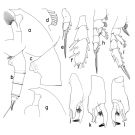 issued from : T. Park in Bull. Scripps Inst. Oceanogr. Univ. California, San Diego, 1995, 29. [p.137, Fig.27]. Female: a, forehead (left side); b, urosome (left); c, genital somite (left); d, outer lobe of Mx1; e, exopod of P1 (anterior); f, exopod of P2 (anterior). Nota: Similar in habitus to P. eltaminae but distinguishable from it: Rostrum in lateral view more elongated with narrower base. Dorsal margin of genital somite with a conspicuous hump anterior to middle. Posterior edge of genital field produced distally into a relatively large lobe. Posterior margin of genital prominence nearly straight, sloping about 35° with respect to long body axis and about as long as posterior ventral wall of genital somite. Cephalosomal appendages and swimming legs similar to those of P. eltaminae with minor exceptions: In Mx1 outer lobe, 2nd seta from proximal end small. Outer spine of 2nd exopodal segment of P1 scarcely reaching base of following outer spine. In P2 exopod, outer spines of 3rd segment better developed Male: g, forehead (left); h, P1 (anterior); i, P2 (anterior); j, distal exopodal segments of left 5th leg (tilted counterclockwise); k, idem (lateral); l, idem (medial).
|
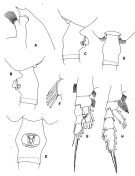 issued from : T. Park in Antarctic Res. Ser. Washington, 1978, 27. [p.279, Fig.117]. As Euchaeta scotti. Female: A, forehead (lateral); B, C, D, E, distal end of metasome and genital segment (left side, right side, dorsal, and ventral, respectively); F, outer lobe of Mx1; G, P1; H, P2. P1-2: legs (anterior).
|
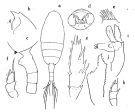 issued from : O. Tanaka in Publs Seto Mar. Biol. Lab., 1958, VI (3). [p.114, Fig.74]. As Pareuchaeta scotti. Female: a, habitus (dorsal); b, forehead (lateral); c, last thoracic segment and part of the urosome (lateral left side); d, genital complex (ventral); e, outer lobe of Mx1; f, f, exopod of P1; g, exopod of P2. Nota: The urosome segments and furca are in the proportional lengths as 48:18:19:7:8: = 100. A1 reaches the middle of the 3rd thoracic segment. Male: h, exopod of P1; i, terminal segments of left P5; j, tooth-plate of the same segment.
|
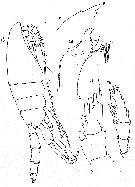 issued from : M.V. Heptner in Trudy. Inst. Okeanol., 1971, 92. [p.88, Fig.6]. As Pareuchaeta scotti . Male (from Kuril-Kamchatka Trench). r, rostrum (lateral); ld, portion of left exopod of P5. Nota:
Formula of the exopod of P1 spines on the last two segments, successively: Aa = 0; Bb = BC (Bb = 1/2 BC). P2: Bb < BC (Bb ≈ 1/2 BC; Cc < CD (Cc ≈ 1/3 CD. [cf. legend in drawings of Heptner, 1971, for Pareuchaeta rubra]
|
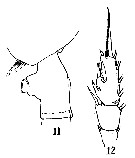 issued from : G.P. Farran in Fish. Ire. Sci. Invest., 1906, II [1908]. [Pl. III, Figs.11-12]. As Euchaeta Scotti. Female (from W Ireland): 11, genital segment (lateral); 12, exopod of P2.
|
 issued from : J. Mauchline in ICES Ident. Leafl. Plankton, 1999, N°182. [p.3, Fig.2: 13a]. As Euchaeta scotti. Female (Northeast Atlantic): 13a, genital double-somite (left side).
|
 issued from : J. Mauchline in ICES Ident. Leafl. Plankton, 1999, N°182. [p.4, Fig.3: 13b]. As Euchaeta scotti.
Male (Northeast Atlantic): 11b, terminal two segments, exopodal segments of left P5.
|
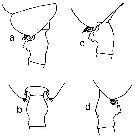 issued from : C. With in The Danish Ingolf-Expedition, Copepoda I, 1915, III, 4. [p.179, Text-fig. 51, a-d]. As Euchaete Scotti. Female (from 61°30'N, 17°08'W): a-d, corner of last thoracic segment and genital segment (lateral and dorsal views).
|
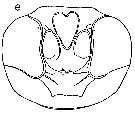 issued from : C. With in The Danish Ingolf-Expedition, Copepoda I, 1915, III, 4. [p.179, Text-fig. 51, e]. As Euchaete Scotti. Female: e, genital area (ventral view).
|
 issued from : C. With in The Danish Ingolf-Expedition, Copepoda I, 1915, III, 4. [Pl. VI, Fig.10, a-b]. As Euchaete Scotti. Female: a, labrum (oral view); b, lamina labialis and serrula 6-dentata.
|
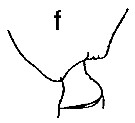 issued from : C. With in The Danish Ingolf-Expedition, Copepoda I, 1915, III, 4. [p.179, Text-fig. 51, f]. As Euchaete Scotti. Male: corner of last thoracic segment and genital segment (left side).
|
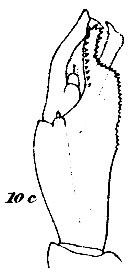 issued from : C. With in The Danish Ingolf-Expedition, Copepoda I, 1915, III, 4. [Pl. VI, Fig.10, c]. As Euchaete Scotti. Male: c, left P5 (2nd and 3rd exopodal segment).
|
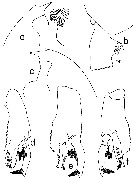 issued from : T. Park in Smiths. Contr. Zool., 1975, 196. [p.21, Fig.18]. As Euchaeta scotti. Female (G. of Mexico): a, forehead (lateral); b, genital segment (right side). pr = posterior ridge of genital field. Nota: The female is characteristic in having a humped dorsal wall of the genital segment and a straightly sloping posterior side of the genital prominence. Male: c, forehead (lateral); d, exopod of left P5 (anterior); e, same (lateral); f, same (medial). Nota: These findings constiute the first record of the species from the Gulf of Mexico and Caribbean Sea, in tows down to depths of more than 1000 m.
|
 Paraeuchaeta scotti Paraeuchaeta scotti Female: 1 - See key to species Groups and independent species of Paraeuchaeta (p.30): malayensis species Group. 2 - Outer spine of 2nd exopodal segment (or the 2nd of the first 2 exopodal segments forming a proximal, compound segment) of P1 normally developed (Fig.27-e). 3 - Outer lobe of Mx1 with 6 long setae in addition to 1 or 2 short, unequal size setae proximally (Fig.27-d). 4 - Genital somite without a conical process on left side close to anterior base of genital prominence (Fig.27-c). 5 - Dorsally and ventrally, genital somite symmetrical. 6 - Laterally, genital flange with normal posterior lobe (Fig.27-c). 7 - Laterally, genital somite with more or less smooth dorsal margin (Fig.27-c). 8 - Laterally, genital prominence with nearly straight or only slightly bulging posterior margin (Fig.27-c). 9 - Outer lobe of Mx1 with 6 long setae plus 1 or 2 very small setae (Fig.27-d). 10 - In 3rd exopodal segment of P2, 2nd marginal lobe separated from segment by shallow cleft and has relatively small outer spine (Fig.27-f).
| | | | | Compl. Ref.: | | | Grice, 1963 a (p.495); De Decker & Mombeck, 1964 (p.13); Suarez-Morales & Gasca, 1998 a (p.109); Razouls & al., 2000 (p.343, Appendix); Park & Ferrari, 2009 (p.143, Table 5, fig.1, Appendix 1, biogeography); Hidalgo & al., 2010 (p.2089, Table 2) | | | | NZ: | 13 + 3 doubtful | | |
|
Distribution map of Paraeuchaeta scotti by geographical zones
|
| | | | | | | | | 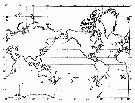 issued from : T. Park in Hydrobiologia 292/293, 1994. [Fig. 2, p.326].
Geographical distribution of Paraeuchaeta scotti (triangle). issued from : T. Park in Hydrobiologia 292/293, 1994. [Fig. 2, p.326].
Geographical distribution of Paraeuchaeta scotti (triangle). |
| | | | Loc: | | | Antarct. (SW Atlant., SE Pacif.), South Georgia, sub-Antarct. (SW Atlant., Indian, SE Pacif., South Africa (E), SW Atlant., Caribbean Sea, G. of Mexico, off Bermuda: Station "S" (32°10'N, 64°30'W), off E & SE Cape Cod, off Azores, off W Ireland, off Rockall Is., ? W Greenland, S Iceland, ? Norwegian Sea, ? Arabian Sea, Mozambique Channel, S Indian, Indonesia-Malaysia, S Australia, Peru, off Is. Juan Fernandez, Chile (N-S), Japan (Sagami), ? Kuril-Kamtchatka | | | | N: | 26 | | | | Lg.: | | | (3) F: 4-4,7; M: 3,8-4,2; (7) F: 5,99; M: 5,56; (19) F: 6,16-5,91; M: 5,58-5,33; (24) F: 6,3-5,7; (99) F: 5,0; M: 4,75; {F: 4,00-6,30; M: 3,80-5,58}
The mean female size is 5.470 mm (n = 8; SD = 0.8156), and the mean male size is 4.870 mm (n = 6; SD = 0.7483). The size ratio (male : female) is 0.926 (n = 4; SD = 0.0191), or ± 92 %. | | | | Rem.: | Bathypelagic.
Sampling depth (Antarct., sub-Antarct.) : 0-600-4000 m. Sargasso Sea: 1000-2000 m (Deevey & Brooks, 1977, station "S");
Park (1978, p.278) raises some doubts regarding the geographical records of this species due to the possible confusions with Paraeuchaeta aequatorialis , P. rasa and P. eltaninae. According to Park (1995, p.41), the records by Tanaka (1958) and Tanaka & Omori (1968) from Pacific coast of Japan seem not referable to P. scotti. The geographical range of the species is in the Atlantic from 62°N to 34°S and in the Pacific and Indian oceans between 4°S and 49°S, absent in the North Pacific.
Park (1995, p.41) found this species sparsely but widely in the following regions of the three Oceans: The eastern and western North Atlantic, the eastern South Atlantic, the South Pacific between 24°S and 39°S, The Malay Archipelago at 4°S, the Coral Sea, the Tasman Sea north of 49°S, and the Mozambique Channel.
Together with the prvious records by Farran (1908), With (1915), Park (1975, 1978), the present study from Park (1995) establishes the geographical range of the species as extending in the Atlantic from 62°N yto 34°S and in the Pacific and Indian oceans between 4°S and 49°S. The species is absent in the North Pacific.
First occurrence in Chilean waters by Hidalgo & al. (2010). | | | Last update : 07/12/2020 | |
|
|
 Any use of this site for a publication will be mentioned with the following reference : Any use of this site for a publication will be mentioned with the following reference :
Razouls C., Desreumaux N., Kouwenberg J. and de Bovée F., 2005-2025. - Biodiversity of Marine Planktonic Copepods (morphology, geographical distribution and biological data). Sorbonne University, CNRS. Available at http://copepodes.obs-banyuls.fr/en [Accessed December 01, 2025] © copyright 2005-2025 Sorbonne University, CNRS
|
|
 |
 |
















